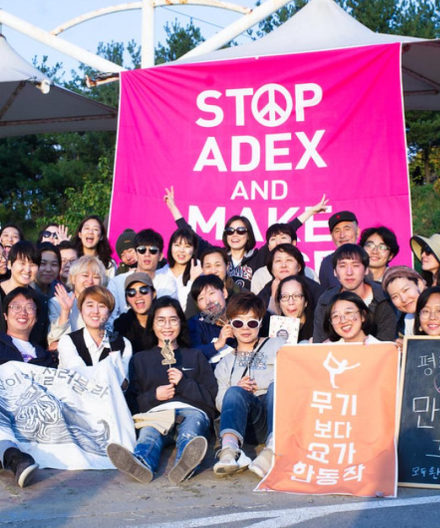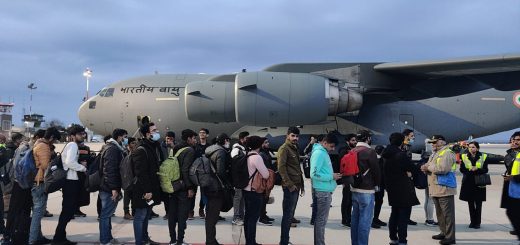World Without War (Korea): 3 x 5 lessons from a 20 years old peace movement
Wanneer we aan het Koreaanse schiereiland denken, doemen vlug beelden op van tot de tanden bewapende militairen, strakke parades, raketlanceringen of vlootoefeningen. Maar Zuid-Korea heeft ook al jaren een heel actieve vredesbeweging die geregeld van zich laat horen bij vreedzame protesten tegen grote wapenbeurzen of tegen de verplichte legerdienst. World Without War bestaat dit jaar precies 20 jaar. Een interview over successen en uitdagingen.
World Without War (WWW) is a member of War Resisters’ International (WRI) based in South Korea, and is one of the most successful pacifist and antimilitarist movements in Asia, taking action on issues such as the arms trade, ending mandatory male conscription and activist empowerment.
This year, WWW is celebrating its 20th anniversary by celebrating its achievements, reflecting on its challenges, and envisioning the coming years/decades.
To mark this occasion, we interviewed front-line activist Jungmin Choi. She has responded to our questions in consultation with the WWW team. Here, they have dived deep into their past, present and future, making this a valuable read for the pacifists and antimilitarists actively resisting war and reducing its causes within the country and globally.
This interview, among other things, considers issues that are crucial for the Asia Peace Network and the wider War Resisters’ International to consider, if we want to build stronger movements to resist the arms trade, take action on climate crisis and militarism, and promote activist emotional wellbeing. As we all know, the devastating effects of these issues transcend national borders.
Happy 20th birthday to World Without War!
In the following interview, we asked Jungmin Choi and World Without War five questions about their work, inviting them to make three observations for each.
What are the three main things about World Without War that activists enjoy being part of?
Jungmin Choi: “The first thing that comes to my mind is the variety of creative actions. Weapons fairs are held regularly [in South Korea], so our actions are quite frequent and regular. Sometimes we risk arrest, sometimes we deliberately avoid it, and sometimes our actions take place in a grey area.”

“We organise peace camps every summer and it is an event that activists look forward to. It is a participatory workshop that brings together people interested in social movements for three days and four nights of reflection on various issues related to militarism and social movements, usually in August.”
“Last but not least, I would say participating in WRI’s international events. Language is always an issue, but we met activists from different countries here and were inspired by their work, so more than one spokesperson (the Korean gang!) took time off work to attend, and we travelled a lot together before and after the event.”

In your experience, what are the three key things you have learned in building a successful movement?
Jungmin Choi: “I don’t know about other countries, but there are not many Korean organisations that have a big party for their 20th birthday. They often disappear before then, especially small organisations, or they are not in party mode because they are smaller than they were in the beginning or their activities have lost momentum.”
“There are many reasons for this, but it seems that internal conflicts often play a major role. Hierarchy in the organisation, which means that the goals and strategies of the movement/organisation are not shared equally by all members, or hierarchy in the decision-making and implementation units, which leads to conflicts, are very common problems.”
“The second is to set short, medium and long-term goals and keep them under review. This is easier said than done, but given the nature of social movements, it’s not always easy, even for experienced activists. Even if you have discussed and decided on your goals, no movement is lucky enough to be able to just go ahead and do it. You have to keep checking in and making sure you’re on the right track.”
“Finally, it’s essential to be flexible as a group. We think it’s important to have a plan but not to be too dense, to have rules but not to be too detailed. If we hadn’t had that flexibility when we heard that South Korean tear gas was being exported to Bahrain, we wouldn’t have been able to act immediately.”

What are your three major successes in the last twenty years?
Jungmin Choi: “I think the first is the introduction of alternative services. This is the result of 20 years of work. Of course, we are not satisfied with the alternative service system that has been introduced, but we don’t think that we should devalue 20 years of work. We just need to work on improving the system again, and a campaign plan is being prepared.”
“Secondly, and related to the first point, the conscientious objection movement has had a positive impact on other campaigns. For example, the presence of conscientious objectors has had a positive impact on the campaign for better treatment in the armed forces, which has led to an increase in soldiers’ pay.”
“We have also worked closely with prisoners’ rights groups because conscientious objectors are regularly sent to prison and, unlike other prisoners of conscience, have to spend quite a long time in prison, up to a year and a half. This has led to improvements in prisoners’ rights, such as a recommendation from the National Human Rights Commission on the right to a vegetarian diet and a change in the practice of fingerprinting in prisons to signatures.”

“Raising awareness about the export of police weapons such as tear gas and water cannons, and actually stopping their export to Bahrain and Turkey, is also a major achievement. We’ve had some luck, but I think the flexibility of our work has allowed us to respond quickly to unexpected requests.”
Can you share three challenges that your movement faces?
Jungmin Choi: “It is a lack of resources, money, time, people, etc. World Without War has three office staff to carry out the various tasks required for its activities, two full-time and one part-time, three days a week at the legal minimum wage. This is not much money to live on, especially in Seoul, except in special circumstances. In fact, one staff member has resigned in the past because of this.”
“Gentrification has also led to skyrocketing rents in Seoul, undermining the stability of the organisation’s operations. In addition, under capitalism, activities often require money, and the lack of money often hinders smooth and effective activities.”
“Communication crises is also common for us. There are often communication problems with formerly imprisoned conscientious objectors and now alternative service members, which are not as serious, but arise from different circumstances and expectations.”
“Indeed, another staff member has resigned in the past due to both financial and burnout issues. These are all issues for which I don’t see many short-term solutions in a small grassroots organisation.”
What are three things you hope to achieve in the coming years?
Jungmin Choi: “Over the past two years, World Without War has been conducting the Next 20 Years Visioning Workshop and has decided to launch a long-term campaign on the climate crisis and militarism. To this end, we decided to set up a task force in the second half of this year to assess our capacities and resources and to consider appropriate campaign plans and demands.”
“Over the next three years, we expect the task force to come up with appropriate plans and demands, hold a general discussion and decision internally, and then start activities in earnest.”

“The second is to launch a campaign to improve the current alternative service. The current alternative service system is problematic in that it is excessively long – twice as long as active service – and limited to assisting prison officers in prisons.”
“Over the past two and a half years since its introduction, we have focused on making the composition of the Alternative Service Commission more human rights-friendly and on gaining access to information about how the system works. We will need to continue to discuss how much and how we allocate our time and resources to this legal advocacy work.”
“Finally, it is about making the declaration of women COs a campaign. Since International Conscientious Objection Day in 2018, several women activists have been inspired by the case of the Turkish conscientious objectors to declare their objection in order to criticise the ‘ideology of normality’ of militarism and to examine the social implications of ‘military service’ as a power conferred. In addition to the ideological level, in the recent backlash against feminism, women’s conscription has actually been discussed in political circles in South Korea. World Without War has been asked to organise non-male COs into a campaign and has reached an internal consensus to start this process.”
(interview by) Subhash Kattel
Subhash Kattel is an elected member of the Executive (international board) of WRI. He is working as a peace activist in Kathmandu, Nepal, and is an active member of the Asia Peace Network.
Dit interview verscheen op 8 september 2023 op de website van War Resisters’ International: https://wri-irg.org/en/story/2023/interview-world-without-war-3-x-5-lessons-20-years-old-movement
Meer weten over World Without War (Korea)? Website: www.withoutwar.org Email: peace@withoutwar.org Facebook: www.facebook.com/withoutwar.org/

On September 22, 2022, peace activists Kim Eunmi, Kim Han Minyeong, Park Jaeyoon, Yeo Jeewoo, Lee Yongsuk, Joo Youngho, Ji Hyeseong, and Choi Jungmin climbed on top of armored vehicles, played the violin and the guitar, chanted slogans holding a banner. The action was taken to criticize the injustice of DX KOREA 2022, where weapons are displayed and traded.
The arms trade fuels conflicts and human rights violations around the world. Wars don’t just happen; they start from when the weapons are made and traded. South Korea, the ninth-largest arms exporter and host of the largest arms fair in East Asia, bears a heavy responsibility for conflicts and human rights violations around the world. Showing how the arms trade is complicit in sustaining and fueling wars and killing countless people is the fundamental obligation that we must bear as citizens.
Een YouTube-filmpje over deze actie tegen de wapenbeurs DX KOREA in september 2022 https://www.youtube.com/watch?v=BuI07OViwr4&t=2s
Lees verder (inhoud november 2023)




